Are you curious to know what is a good fuel? You have come to the right place as I am going to tell you everything about a good fuel in a very simple explanation. Without further discussion let’s begin to know what is a good fuel?
What Is A Good Fuel?
In a world heavily dependent on energy, the search for efficient and sustainable fuel sources is more important than ever. A good fuel is one that meets specific criteria, including high energy content, availability, affordability, and environmental friendliness. In this blog, we will explore the qualities of a good fuel, the significance of choosing the right fuel sources, and some examples of fuels that meet these criteria.
Qualities Of A Good Fuel:
- High Energy Content: A good fuel should possess a high energy content per unit of mass or volume. This allows it to release substantial energy when combusted or used in various energy conversion processes. High energy content ensures maximum efficiency and optimal utilization of the fuel.
- Availability and Accessibility: An ideal fuel should be readily available and accessible. It should be abundant in nature or easily producible to meet the ever-increasing energy demands of society. Availability ensures a stable supply chain, reduces dependency on limited resources, and promotes energy security.
- Affordability: Affordability is a crucial aspect of a good fuel. It should be economically viable, with reasonable production costs and a competitive price in the market. An affordable fuel option ensures widespread access to energy resources, enabling economic growth and development.
- Energy Density: Energy density refers to the amount of energy stored per unit of volume or weight. A good fuel should have a high energy density, allowing for efficient storage and transportation. Higher energy density reduces the volume or weight required for a given energy output, making it more practical and convenient for various applications.
- Environmental Impact: In today’s era of increasing environmental concerns, a good fuel should have minimal negative impact on the environment. It should produce lower emissions of greenhouse gases, pollutants, and particulate matter during combustion. Environmentally friendly fuels contribute to sustainable development, combat climate change, and preserve natural resources.
Examples Of Good Fuels:
- Natural Gas: Natural gas is considered a good fuel due to its high energy content, low carbon emissions, and wide availability. It is primarily composed of methane and is used extensively for heating, electricity generation, and as a fuel for vehicles. Natural gas has gained popularity as a cleaner alternative to coal and oil.
- Biofuels: Biofuels, such as ethanol and biodiesel, are derived from renewable sources like plants, algae, and waste biomass. They are considered good fuels because they are carbon-neutral or have lower carbon emissions compared to fossil fuels. Biofuels have been used in transportation and can be blended with conventional fuels, reducing greenhouse gas emissions.
- Solar Energy: Solar energy is an abundant and renewable energy source. It harnesses the power of the sun through photovoltaic cells and solar thermal systems. Solar energy is considered a good fuel as it is clean, sustainable, and does not produce any emissions during electricity generation.
- Hydrogen: Hydrogen is a versatile fuel that can be produced from various sources, including water, natural gas, and biomass. It is a good fuel choice due to its high energy content, zero emissions when used in fuel cells, and potential for long-term storage. Hydrogen can be utilized in transportation, power generation, and industrial processes.
- Wind Energy: Wind energy harnesses the power of the wind through wind turbines to generate electricity. It is a clean and renewable fuel source that has gained prominence in recent years. Wind energy is abundant, widely available, and emits no greenhouse gases during electricity production.
Conclusion:
Choosing a good fuel is crucial for meeting our energy needs while considering environmental sustainability and economic viability. A good fuel possesses qualities such as high energy content, availability, affordability, energy density, and environmental friendliness. As we strive for a more sustainable future, embracing fuels like natural gas, biofuels, solar energy, hydrogen, and wind energy can contribute to reducing our carbon footprint and ensuring a reliable and clean energy supply. It is through responsible fuel choices that we can power our world efficiently while preserving our planet for future generations.
FAQ
What Is Considered A Good Fuel?
A fuel is considered good or valuable if it has a low ignition temperature and it produces a large quantity of heat and has high calorific value. Ideal fuels should be easy to store, leave behind no ash after being burnt and burn easily.
What Is Good Fuel On Short Note?
A fuel is said to be good fuel if it produces a large amount of heat on burning without producing a lot of smoke, and is easily available. Note : However, not every combustible chemical is a good fuel. A good fuel must emit a lot of heat energy into the environment.
What Is A Fuel Class 8?
Any substance that upon combustion produces a usable amount of energy is known as fuel. For example wood, coal, biogas, LPG, petrol, diesel, etc.
What Is A Good Fuel Class 10?
“A good fuel is one which is readily available.” Fuel is considered a good fuel if it burns without producing a lot of smoke. A good fuel is easily accessible and available at an economical price.
I Have Covered All The Following Queries And Topics In The Above Article
What Is A Good Fuel Economy
What Is A Good Fuel Consumption
What Is A Good Air To Fuel Ratio
What Is A Good Fuel Efficiency
What Is A Good Fuel Consumption Per 100km
What Is A Good Fuel
What is a good fuel definition
What is a good fuel?



